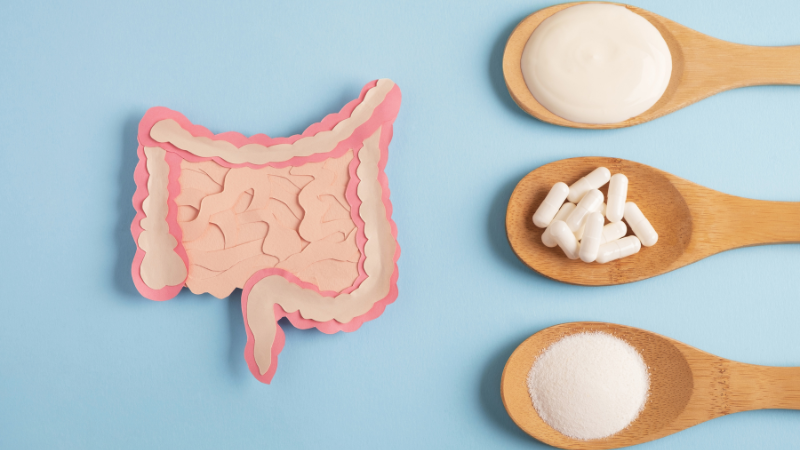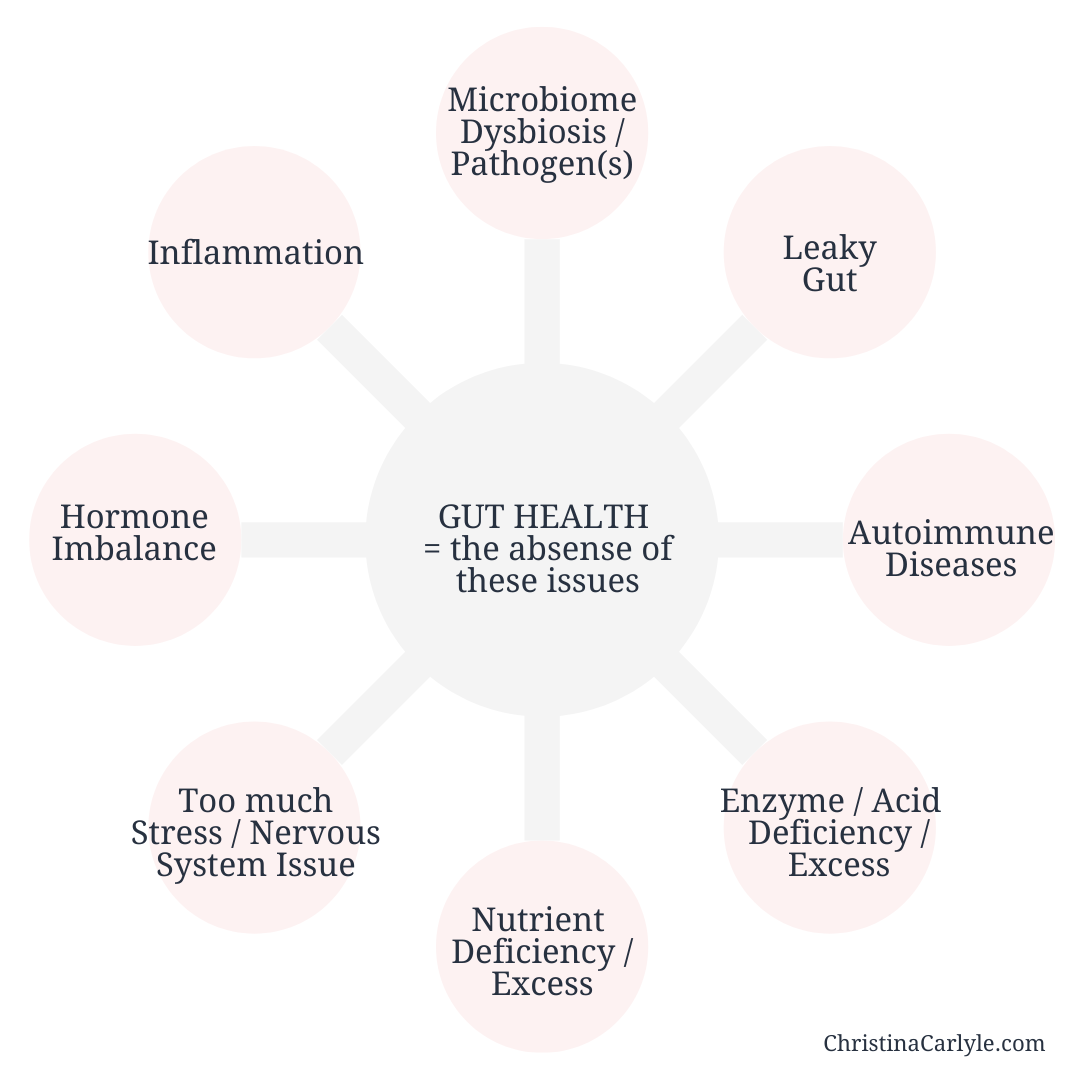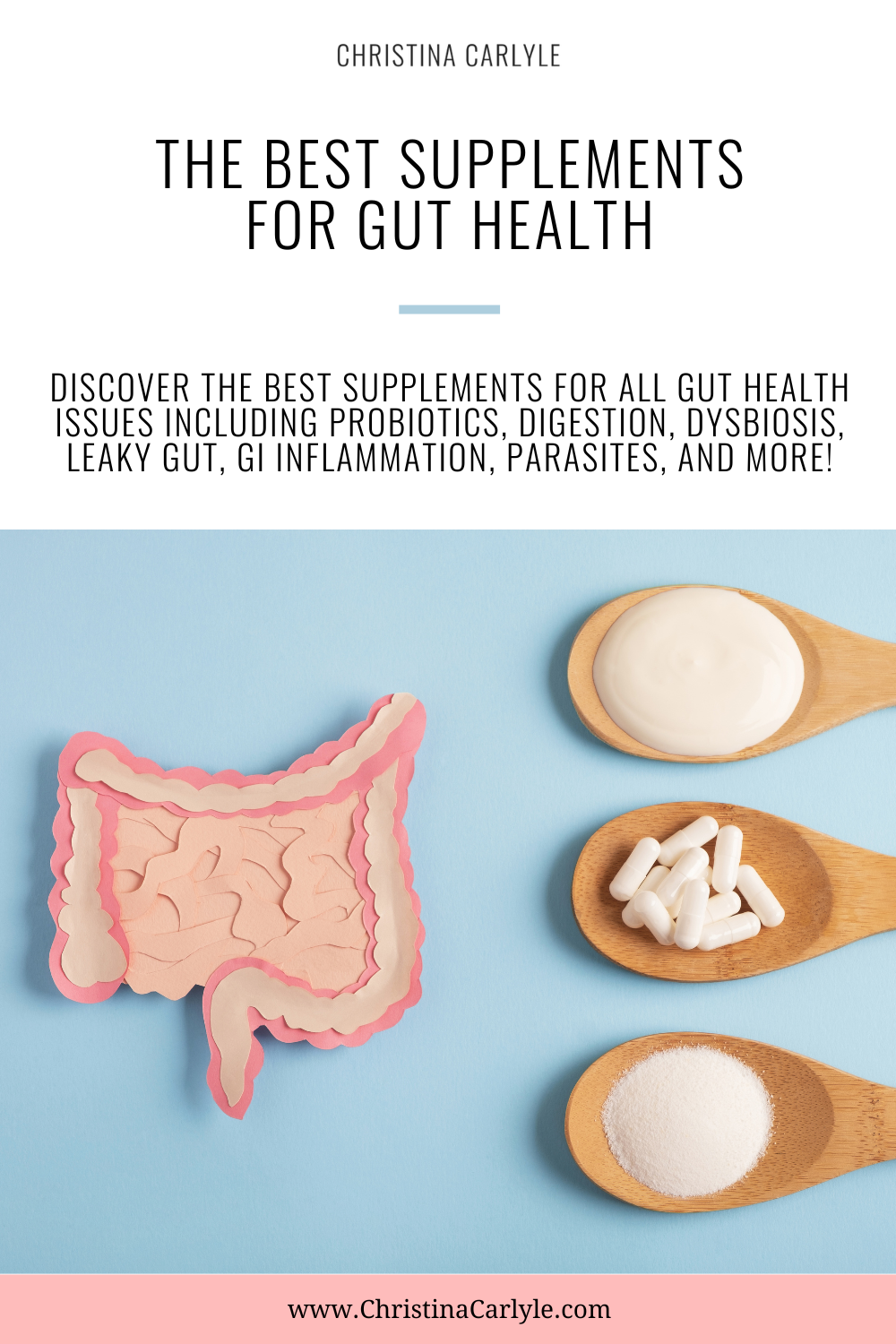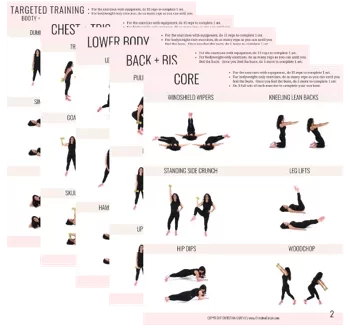Last Updated on June 29, 2023
Supplements can be extremely beneficial when trying to heal, balance, and optimize gut health.
Remember, Gut Health is defined as the absence of (all) issues.
They are…
It’s important to note that each of these different gut health issues can change the kind of supplements you need – and which ones you should avoid.
For example, someone with low stomach acid & digestive enzymes would need a completely different approach than someone with dysbiosis and leaky gut or someone with a pathogen and systemic inflammation.
First, I’ll go over the best gut health supplements for general health. Then I’ll go over the supplements recommended most for specific gut health issues like low stomach acid or leaky gut.
Before I do it’s important to note that I do NOT recommend adding on supplements exclusively to help with gut health. The first step BEFORE adding supplementation is to clean up the diet.
If someone has intestinal inflammation and takes an anti-inflammatory supplement, it’s not going to do much if they continue to eat and drink inflammatory foods.
If someone has a leaky gut and starts taking a bunch of probiotics and supplements, they can break down and circulate throughout the body, triggering more inflammation in the process.
If someone takes probiotics to reverse dysbiosis and fight a pathogen but is also consuming things that fuel pathogens, the pathogens will become stronger, more resistant, and harder to kill.
A lot of gut health issues and gut-damaging consumables prevent nutrient absorption. So taking gut health supplements with the wrong foods (and drinks) is a waste of time time and money.
Bottom line… address your diet, before adding supplements, otherwise the supplements I recommend will be ineffective and pointless.
Taking supplements with the right foods makes it significantly easier to absorb nutrients from food and supplements properly and get results (that you can see and feel) quickly.
To get benefits from supplementation you’ll need clean, quality, results-oriented supplements at specific dosages. The exact amount of each supplement you need varies based on pre-existing conditions and what gut health issues are present.
For example, someone with a pathogenic microbe and dysbiosis may need 10 specific probiotic strains and 50+ billion CFUs. But someone wanting to maintain gut health and balance may only need 4 strains and 5 billion CFUs.
The gut health supplements I recommend (below) have ‘generic’ serving sizes needed to get results. You can take them as directed or as directed after checking with your medical or healthcare professional.
If you want a customized, results-oriented supplement regime for your unique issues, apply to work with me and I’ll help you. I have access to pharmaceutical-grade supplements (that you won’t see here) that are only available via one-one-one session.
Supplements for General Gut Health
As discussed the first step is to clean up your diet. As you are I recommend taking these supplements.
Probiotics: Probiotic supplements contain live beneficial bacteria that can colonize the gut and support a healthy balance of the microbiota. They can help improve digestion and nutrient absorption, strengthen the gut barrier, optimize the immune system and metabolism, and promote overall gut health. Different strains have different effects on gut health. For example, Lactobacillus and Bifidobacterium strains are commonly used for health support. But others are used for specific conditions for example, Saccharomyces boulardii which is recommended for antibiotic-associated diarrhea or Clostridium difficile infection. Make sure you eat probiotic foods, too.
Prebiotics: Prebiotic supplements contain non-digestible fibers that serve as fuel for beneficial bacteria in the gut. They can stimulate the growth and activity of these bacteria, promoting a diverse and healthy gut microbiota. Common prebiotic supplements include inulin, FOS, and GOS. They can help improve the composition of the gut microbiota, enhance the production of short-chain fatty acids (SCFAs) that support gut health, and have potential benefits for digestion, immunity, and inflammation in the gut. Always pair your prebiotics with omega 3’s for optimal absorption. I recommend eating prebiotic foods to get the fibers you need. I do not recommend pre-biotic supplements. I do however recommend digestive enzymes with prebiotic fibers.
Omega-3 Fatty Acids: Omega-3 fatty acids, particularly EPA and DHA, are polyunsaturated fats with anti-inflammatory properties. Omega-3 fatty acids can help reduce inflammation in the gut and modulate immune responses. rs. Omega-3s also support overall cardiovascular health and have various systemic benefits beyond the gut. The best food sources include fatty fish like salmon, mackerel, sardines, trout, and herring. Plant-based sources such as chia seeds, flaxseeds, and walnuts offer alpha-linolenic acid (ALA), another type of omega-3 fatty acid. Supplement your diet with some plant and animal sources of omega-3s to keep your gut healthy. You can also add in these omega-3 fatty acids. Here’s an omega-3 with animal sources. Unfortunately, there aren’t any vegan/vegetarian options I recommend. I recommend getting a lot of omega 3s in your diet via the food options in addition to supplementing with this omega 3 supplement.
Multivitamin: Incorporating a multivitamin into your regimen can be beneficial for several reasons. Firstly, it provides crucial support by delivering a wide range of essential vitamins and minerals, compensating for potential nutrient deficiencies that may arise from gastrointestinal issues or malabsorption problems. Secondly, a multivitamin can aid in bolstering the immune system, which plays a vital role in gut healing. Many multivitamins contain immune-supportive nutrients like vitamin C, vitamin D, zinc, and selenium. Additionally, the antioxidants present in multivitamins, such as vitamins A, C, and E, along with other phytonutrients, can help counteract oxidative stress and inflammation, contributing to the healing process. Lastly, by addressing nutrient gaps, a multivitamin can provide the necessary vitamins and minerals for energy production, thus supporting overall vitality and well-being during the healing journey. I recommend this multivitamin for women.
These supplements are recommended for achieving and maintaining health. The rest of the following gut health supplements I recommend using on an as-needed basis.
Best Supplements that balance Stomach Acids & Digestive Enzymes
Supplements that balance stomach acid and support digestive enzymes can play a crucial role in healing the gut by optimizing digestion and nutrient absorption.
These supplements help address issues such as low stomach acid or inadequate enzyme production, which can hinder proper digestion and lead to gut imbalances. They enhance the breakdown of food and the absorption of nutrients. This not only aids in alleviating digestive discomfort but also supports the healing process by ensuring optimal nutrient availability for gut repair and restoration.
The following can help improve gut function and nutrient absorption, leading to improved overall gut health and well-being. Again diet is very important so make sure you pair these with a healing meal plan.
- Betaine HCl: Betaine hydrochloride (HCl) is a supplement that provides hydrochloric acid, which can help support stomach acid levels, specifically in cases of low stomach acid production. Anti-acids lower stomach acid… but the root cause of the symptoms can actually lower acid further. Low stomach acid levels can lead to various digestive issues, including bloating, gas, indigestion, and nutrient malabsorption. Some conditions and factors that may contribute to low stomach acid include aging, chronic stress, certain medications (e.g., proton pump inhibitors), and certain medical conditions (e.g., autoimmune disorders, gastritis). HCl (hydrochloric acid) supplements may be beneficial for individuals with low stomach acid production or hypochlorhydria. I like this one! It has HCL and digestive enzymes.
- Digestive Enzymes: Digestive enzyme supplements contain enzymes like amylase, lipase, and protease, which aid in the breakdown of carbohydrates, fats, and proteins, respectively. These supplements can be particularly beneficial for individuals with conditions that affect enzyme production, such as pancreatic insufficiency or certain digestive disorders. By assisting in the digestion process, digestive enzyme supplements can help reduce symptoms like bloating, gas, and indigestion, and enhance nutrient absorption.
- Peppermint Oil: Peppermint oil is known for its soothing effects on the gastrointestinal tract. It may help relax the muscles of the digestive system, alleviate symptoms like indigestion, and promote healthy digestion. Take a few drops of this organic peppermint oil orally after you eat. As a bonus, it’ll freshen your breath.
Anti-inflammatory supplements for the Gut (and repairing leaky gut & GI Tract damage)
Anti-inflammatory supplements play a vital role in gut healing by addressing inflammation, reducing oxidative stress, and supporting the restoration of the intestinal lining.
These supplements help combat chronic inflammation in the gut, calming the immune response and promoting the healing process. By reducing oxidative stress, they protect against damage caused by harmful free radicals. Additionally, anti-inflammatory supplements support the restoration of the gut barrier, strengthening its integrity and reducing intestinal permeability.
They also modulate the immune response in the gut, creating a healthier immune environment conducive to healing. Incorporating these supplements into a comprehensive gut-healing approach can support the restoration of gut health and overall well-being.
- Curcumin: Curcumin is a compound found in turmeric and has potent anti-inflammatory properties. It can help reduce inflammation in the gut and promote gut health. However, curcumin’s bioavailability is limited, so consider using a supplement that includes black pepper extract (piperine) for better absorption.
- Ginger: Ginger has been used traditionally for its anti-inflammatory and digestive properties. It can help reduce gut inflammation and alleviate gastrointestinal discomfort. Ginger supplements or consuming ginger in various forms, such as fresh ginger root or ginger tea, can be beneficial. I recommend supplementing this ginger tea into your diet in addition to adding the food source in lieu of swallowing a pill. Dandelion and turmeric tea would be great, too.
- Quercetin: Quercetin is a flavonoid found in various fruits and vegetables. It has antioxidant and anti-inflammatory properties and may help reduce inflammation in the gut. Quercetin supplements are available, but it’s also found in foods like apples, onions, and berries.
- L-Glutamine: L-Glutamine is an amino acid that provides significant benefits for gut health. It supports the growth, repair, and maintenance of the intestinal lining, strengthening the gut barrier and preventing “leaky gut.” L-Glutamine also helps regulate immune responses in the gut, contributing to a healthy immune system and enhancing the body’s defense against infections. Additionally, it plays a role in nitrogen transport, aiding in gut healing and promoting overall gut health. See the L-Glutamine I recommend. I love this brand. Mix a serving size into your coffee, tea, smoothie, or water.
- Aloe: Aloe offers potential benefits for gut health due to their soothing and anti-inflammatory properties. Aloe vera, a succulent plant, contains a gel-like substance within its leaves that is rich in bioactive compounds. These compounds, such as polysaccharides, glycoproteins, and antioxidants, have been found to possess anti-inflammatory and immune-modulating effects. When taken as a supplement, aloe can help soothe and calm the gastrointestinal tract, reducing inflammation and irritation. It may also support the healing of the gut lining by promoting cell regeneration and the production of collagen. Furthermore, aloe supplements have shown potential in alleviating symptoms associated with digestive disorders such as irritable bowel syndrome (IBS) and ulcerative colitis. I recommend drinking 2 oz. of organic aloe vera juice every morning on an empty stomach. I do and I love it!! You want whole-leaf aloe juice, NOT just inner fillet FYI.
If you’re following a healing meal plan along with L-Glutamine and aloe exclusively. A healing meal plan is anti-inflammatory so you won’t need anti-inflammatory supplements… just the healing supplements.
BEST Dysbiosis Balance (plus, PARASITE & PATHOGEN) SUPPLEMENTS
The following are the best supplements for dysbiosis.
- Black Walnut Hull: Black walnut hull extract is commonly used as a natural antiparasitic supplement. It contains compounds like juglone that have been traditionally believed to help combat certain parasites.
- Wormwood: Wormwood, specifically the herb Artemisia absinthium, is known for its potential antiparasitic properties. It contains compounds such as artemisinin that are thought to have antiparasitic effects.
- Clove: Clove and its essential oil are believed to possess antiparasitic properties. The active compound in cloves, called eugenol, has been studied for its potential ability to combat certain parasites.
- Garlic: Garlic has been used for its potent antimicrobial and antiparasitic properties. Allicin, a compound found in garlic, is thought to contribute to its therapeutic effects.
- Grapefruit Seed Extract: Grapefruit seed extract (GSE) is often used as an antimicrobial and antiparasitic supplement. It contains compounds such as citrus bioflavonoids that may help combat parasites.
- Oregano Oil: Oregano oil is believed to have potent antimicrobial properties, including potential antiparasitic effects. It contains compounds like carvacrol and thymol, which are thought to contribute to its activity against parasites. I like (and use) this oregano oil! Take as directed.
- Papaya Seed: Papaya seeds have been traditionally used for their potential antiparasitic properties. They contain enzymes such as papain that may help eliminate parasites. I like to use 1 serving of this papaya seed powder in my smoothies when treating pathogens.
In addition to things that help kill pathogens, you also need to take balancing and detox supplements to avoid die-off symptoms.
Instead of taking these individually, I recommend taking supplements that work as a ‘system’ that has the antimicrobial ingredients, probiotics, and binders needed to help the body kill and eliminate pathogens & toxins quickly and safely while restoring balance.
This system is my absolute favorite way to boost gut health, clear out the bad bugs, and balance the microbiome. The 30-day kit comes with everything you need.
I do this system 2-4 times a year and LOVE IT! For the best results use along with my Total Transformation Program meal & workout program and you can lose up to 20 pounds (and feel incredible) in 4 weeks.
If you have a more severe or systemic infection I recommend my Total Transformation Program, this kit, and adding on oregano oil, and papaya seed powder. This blend of approaches helps take down bacteria, viruses, amoebas, fungus, candida, protozoa, and worms.
I hope this guide to the best supplements for gut health helped you. Remember, for the best results use along with my Total Transformation Program meal & workout program. You can lose up to 20 pounds (heal and feel incredible) in 4 weeks.
If you want help with a custom plan fill out an application to work with me to get started.
Forever rooting for you!
Your Coach and Biggest Cheerleader,
![]()
MORE GUT HEALTH & WEIGHT LOSS INFO
Check out these related articles to fill in more of the “gut health puzzle” so you’ll understand more about the different aspects of gut health, how they cause symptoms & weight gain, and how to optimize your gut health to maximize your weight loss potential:
- Gut Health and Weight Loss
- What are Probiotics?
- Probiotics and Weight Loss
- What are Prebiotics?
- The Best Foods for Gut Health
- What is Leaky Gut?
- Gut Health Supplements
- Intestinal Inflammation
- Gut Microbiome
Remember, if you have gut health symptoms you most likely also have metabolic dysfunction. This free training explains more about metabolic dysfunction & how I fix it so you can lose weight & feel great ASAP.







